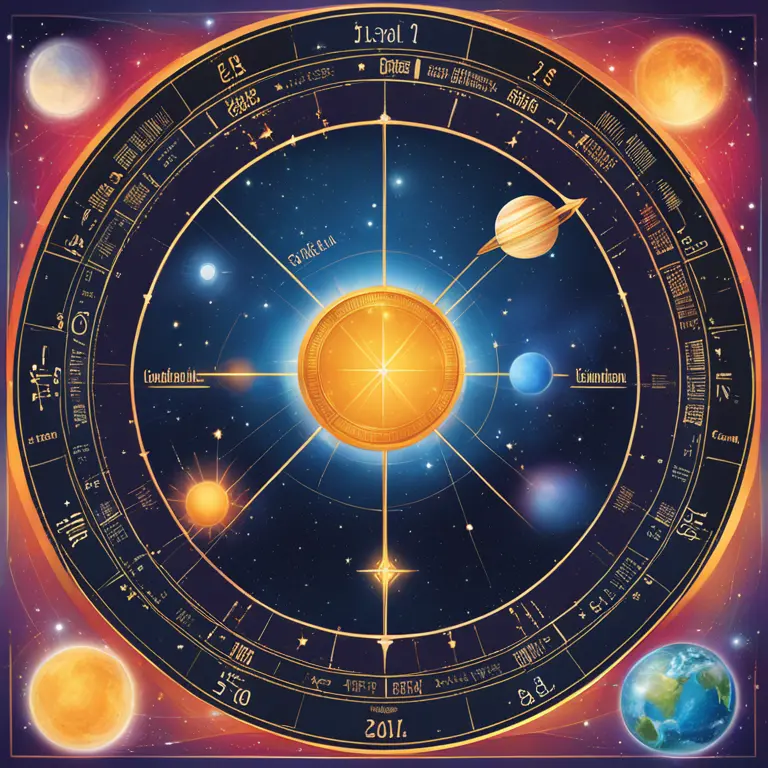
Astrology Houses: The Foundations of Your Chart
Learn how astrological houses are determined in your natal chart and their significance in shaping your personality and life events.
article by Priya Deshmukh
Introduction to Astrology Houses
Astrology is a complex and multifaceted practice that can provide insight into an individual's personality, life events, and potential future. One essential component of astrology is the concept of houses. These astrological sectors divide the sky as seen from Earth into twelve distinctive zones, each one corresponding to various aspects of our daily lives. Their determination is rooted in the time and location of an individual's birth, making every person's astrological chart unique. In this article, we'll dissect the methodology behind pinpointing astrology houses and their significance in our natal charts.

The Birth Chart: Your Cosmic Blueprint
The birth chart, or natal chart, is essentially a celestial snapshot of the sky at the moment of your birth. It is a personalized cosmic blueprint that guides astrologers in interpreting your life's potentials and challenges. To create a birth chart, one must have accurate birth details, including date, time, and place. These particulars enable astrologers to calculate precise positions of the planets and the zodiac signs they occupy, along with the cusp, or starting point, of each astrological house.

Calculating the Ascendant and Houses
The Ascendant, or rising sign, is the first piece of the puzzle in determining astrology houses. It's the zodiac sign that was on the Eastern horizon at the moment of birth, and it marks the cusp of the First House in the natal chart. From there, houses can be calculated using various systems, like the Placidus, Equal House, or Whole Sign systems, each dividing the sky differently. While the Placidus system, the most commonly used, bases house division on the time it takes for the entire zodiac to rise over the horizon, the Whole Sign system simply allocates an entire sign to each house, making calculations more straightforward.

The Meaning of the Twelve Houses
Each of the twelve astrological houses represents a specific area of life, starting with the Self in the First House and ending with the Subconscious in the Twelfth. For instance, the Second House focuses on values and possessions, while the Seventh House deals with partnerships and marriage. When a planet resides in a particular house in your chart, its energies and attributes intermingle with the life area signified by that house, thus affecting that domain in your life.

Transits and Progressions
Astrological houses also play a significant role in interpreting transits and progressions, the movements of planets in the present or future in relation to the natal chart. As planets move through the houses, they activate specific energies associated with those houses. For 2024 and beyond, understanding transits can provide a forecast that helps individuals prepare for opportunities and challenges ahead in their personal and spiritual development.
The Impact of House Determination
The method used to calculate astrology houses can significantly impact an individual's chart interpretation. In Vedic astrology, for instance, the Whole Sign house system is often preferred. By choosing one system over another, the houses occupied by planets can shift, resulting in different astrological readings. Therefore, it is crucial to understand the basis of your astrological assessments, especially in nuanced areas such as career trajectory, relationships, and personal growth.
Published: 2/5/2024
Modified: 2/5/2024
More predictions
Come back here soon to learn more about yourself and your future


Astrological Insights on Fertility and Pregnancy Prediction
Delve into how astrology can be used to predict the potential for pregnancy and understand the influence of cosmic patterns on fertility.


Finding Love in the Stars: When Will You Meet Your Husband?
Discover the intriguing role of astrology in predicting the timeline of meeting your future husband and how celestial insights might guide you to your soulmate.


Choosing Your Perfect Wedding Date with Astrology
Discover how astrology can guide you to the optimal timing for your marriage, aligning celestial favor with your love life.